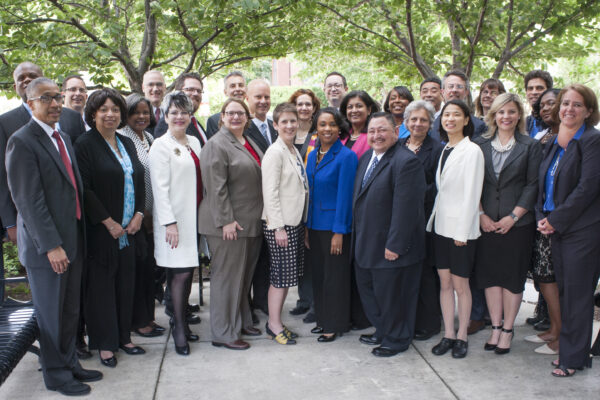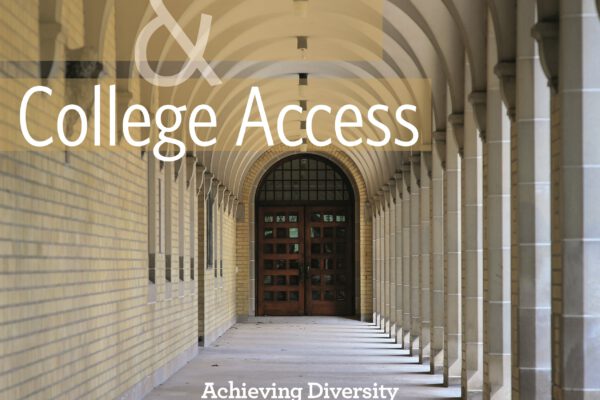 ACE Fellow Audrey Bilger moves between the public and private sectors—and discovers they have more in common than is usually thought.
ACE Fellow Audrey Bilger moves between the public and private sectors—and discovers they have more in common than is usually thought.
The first time I crossed sectors, I moved from being the product of public education—Oklahoma State and the University of Virginia—to a small liberal arts college, and the experience changed my life.
A newly minted Ph.D. and visiting assistant professor at the time, I fell in love with Oberlin College and with its small classes and intimate environment. When a tenure-track position in my field of literature opened up at Claremont McKenna College (CMC) and I accepted the job, I was delighted to be able to stay in the private sector, where I have remained for over two decades.
As a 2014-15 ACE Fellow, I am crossing over once again from my private liberal arts home to a large public research institution, the University of California, Riverside. Just 30 miles east of CMC (which is 30 miles east of Los Angeles, where I live), UCR is an ideal place for me to witness public education at its best.
UCR is designated as a Hispanic Serving Institution (HSI); 59 percent of the undergraduates are eligible for Pell Grants, and 60 percent are first-generation college students. When I attended convocation at the beginning of the fall quarter and looked out at the assembled group of first-year students, I was dazzled by how many there were—several thousand, more than triple the size of CMC’s entire student body. And the diversity was downright inspirational.
In my first months as a visitor at UCR, I have shadowed members of the leadership team in numerous meetings in which they articulate a desire to preserve the university’s tradition of access and diversity as they implement a strategic vision that calls for an increased student body and 300 new faculty hires. What has become most clear to me is that even at a large research university, the administration and faculty care deeply about students, and virtually everyone I have met has expressed interest in fostering inclusivity alongside excellence.
From Private to Public
Former ACE Fellow (2012-13) Susan Frye, dean of outreach and professor of English at the University of Wyoming, who visited my home institution for her fellowship year—a reverse journey from the one I am taking—was also struck by the shared concern for student learning in both the public and private sector.
“I saw with my own eyes that the most valued undergraduate experiences of selective privates are widely duplicated at strong publics. The small, faculty-led first-year seminar, the opportunity for intensive seminars in the major, for short- and long-term study abroad, for service learning, and for one-on-one undergraduate research with a faculty member…these also exist for thousands of students in public universities.”
Another former Fellow (2013-14), Patricia Price, professor of geography at Florida International University, also spent her fellowship at the Claremont Colleges, visiting Harvey Mudd College and Claremont Graduate University. She said that her host institutions “are about as different as they could possibly be” from her home institution, a large minority-serving university.
Something Price mentioned that I have noted as well is the difference in the leadership structure at small privates versus large publics. “Small elite colleges are organizationally flatter than large ones, which tend to be more verticalized and siloed,” she said “Leaders must be generalists in the former, conversant in both student and faculty affairs in addition to the traditional concerns of academic leadership. But they must be excellent team builders and intensely data driven in larger places in order to get anything done.”
Among the many benefits of the ACE Fellows program, the opportunity to go inside a different type of institution opens up new vistas and provides fellows with an enhanced sense of possible options within higher education.
One of my 2014-15 classmates, Joddy Murray, associate professor of English and director of undergraduate studies at Texas Christian University, is spending the year at Florida Institute of Technology (FIT) in Melbourne, Florida. FIT is a private STEM-oriented school, and Murray has been impressed by the appetite for innovation he sees there.
“From ‘laser day’ to ‘start up weekend’ to its “Robotics and Spatial Systems Laboratory,” from planetary science to nanoscience and to ocean engineering, the place brings out the nerd in me and it is exciting to be here,” he told me.
I share Murray’s excitement as I continue to discover how the various pieces of the UCR universe fit together. Even though I’ve only been there a short time, I have already grown more accustomed to the scale, and I marvel at the skill my mentors bring to the complex issues they must address on a daily basis.
Because UCR is part of the University of California system, I am also able to observe how the universities operate as a much larger entity within the state in ways that simultaneously resemble and differ vastly from the Claremont Colleges, my home base, which consists of five undergraduate colleges and two graduate institutions.
The experience of stepping away from my regular routine this year has allowed me to gain a greater sense of the big-picture issues in higher education—financial challenges, innovations, disruptions, questions about value and values. I see more clearly the role that engaged, highly motivated leaders can play in transforming institutions while remaining faithful to core missions.
At the end of each day at UCR, I drive past CMC on the freeway. In that space between the two schools, I reflect on how honored I am to be on a journey to expand my knowledge of how better to serve within this complex 21st century educational landscape. Although the road is familiar, I am charting an entirely new course.
Audrey Bilger is the faculty director of the Center for Writing and Public Discourse and professor of literature at Claremont McKenna College. Her most recent book, Here Come the Brides! Reflections on Lesbian Love and Marriage, coedited with Michele Kort, was a 2013 Lambda Literary Award finalist. She is the author of Laughing Feminism: Subversive Comedy in Frances Burney, Maria Edgeworth, and Jane Austen. She is a member of the Ms. Committee of Scholars and serves on the editorial boards of Pickering and Chatto’s Gender and Genre series and the Burney Journal. Her work has appeared in Ms magazine, the Ms blog, the Paris Review, the San Francisco Chronicle, the Los Angeles Times, and The Los Angeles Review of Books. Photo above by Greg Allen.
If you have any questions or comments about this blog post, please contact us.


